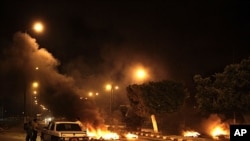Gunmen Tuesday blew up a pipeline that supplies gas to Israel and Jordan. Egyptian officials say the attackers arrived at the Sinai Peninsula facility in two pickup trucks before dawn. A loud explosion then rocked the pumping station, sending an orange plume of fire into the sky.
It was the sixth attack on the pipeline since the Egyptians forced former President Hosni Mubarak from office in February, leaving military officials temporarily in charge. Egyptian authorities blamed the latest attack and others on Islamic militants opposed to the 32-year-old peace treaty between Egypt and Israel.
The attacks have raised concern in Israel about a possible security vacuum in Sinai, which borders both Israel and the Palestinian-ruled Gaza Strip.
Israeli army officials say that since Mubarak's ouster there has been a massive increase in weapons smuggling to Gaza, which is controlled by Islamic militant group Hamas. They also say militants from Gaza have been crossing into Sinai to carry out attacks.
"This is a very major challenge for the new Egypt because it could deteriorate to a situation like what we have in Pakistan, where there are areas of the country that are not under control," says Israeli analyst Dan Schueftan. "It is a challenge to the Egyptian sovereignty."
Egyptian political analyst Hisham Kassem says Israeli Army officials are exaggerating security threats in Sinai that, he says, begin with unemployment and poverty.
"Israel is always alarmist about anything that has to do with security," he says. "Not that there isn’t a concern, but I think they’re magnifying the security concerns [and] I think the first thing to secure Sinai is to create jobs there."
A turning point in the Sinai situation occurred in August, when Palestinian gunmen from Gaza crossed into Sinai and then infiltrated southern Israel, killing eight Israelis on a road along the Egyptian border.
Schueftan says Egypt's change in leadership has altered Israel's strategic equation for the worse after decades of calm along the Sinai border.
"The Sinai Peninsula is extremely precarious because this it is a border that needs to be considered as a hostile border, even if Egypt as a country is not a hostile state to Israel," he says.
To combat the problem, Israel and Egypt have agreed on an increased Egyptian troop presence in Sinai for the first time since the peace treaty was signed in 1979. And Israel is taking steps on its own, constructing a 265-kilometer border fence at a cost of about $300 million.
Sinai Pipeline Attacks Spotlight Post-Mubarak Border Security




